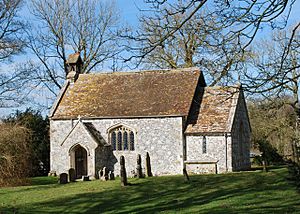St Andrew's Church, Rollestone facts for kids
Quick facts for kids St Andrew's Church, Rollestone |
|
|---|---|

St Andrew's Church, Rollestone, from the south
|
|
| Lua error in Module:Location_map at line 420: attempt to index field 'wikibase' (a nil value). | |
| OS grid reference | SU 074 431 |
| Location | Rollestone, Shrewton, Wiltshire |
| Country | England |
| Denomination | Anglican |
| Website | Churches Conservation Trust |
| Architecture | |
| Functional status | Redundant |
| Heritage designation | Grade II* |
| Designated | 18 February 1952 |
| Architectural type | Church |
| Specifications | |
| Materials | Flint and stone |
St Andrew's Church is a very old church located in Rollestone, a small place in Wiltshire, England. It's an Anglican church, which means it belongs to the Church of England. However, it's no longer used for regular church services. Instead, it's looked after by the Churches Conservation Trust. This special group helps to protect and preserve old churches that are no longer needed for daily worship.
The church was officially declared "redundant" on July 1, 1993. This means it stopped being used for regular services. On February 8, 1995, the Churches Conservation Trust took over its care. St Andrew's Church is also a "Grade II* listed building." This means it's a very important historical building in England, recognized for its special architecture and history.
Contents
A Look Back in Time
How Old is the Church?
St Andrew's Church was built a very long time ago, in the early 13th century. That's around the early 1200s! Imagine how many events and changes this building has seen over the centuries.
Knights and Queens
For many years, until the time when many monasteries were closed down in England, the church belonged to a group called the Knights Hospitaller. These were a special order of knights who helped people and looked after hospitals.
There's also an interesting story that Jane Seymour might have been baptized here. Jane Seymour later became one of King Henry VIII's wives. She was born around 1508. However, historians think this might be a mistake, and she might have been baptized at a different church with a similar name. It's a fun historical mystery!
What the Church Looks Like
Building Materials and Design
The church is built using two main materials: flint and stone. They are arranged in a cool checkerboard pattern, which makes the walls look unique. The church has two main parts: the chancel and the nave. The nave is the main part where people would sit. It measures about 32 feet long and 15 feet wide. The chancel, which is the area near the altar, is a bit smaller, about 9 feet 8 inches long and 9 feet 6 inches wide.
Changes Over the Years
The roof of the nave was replaced in the 16th century, which means around the 1500s. Later, in 1845, some rebuilding work was done on the chancel and the arch that connects the chancel to the nave.
The church has two large windows that are in the Perpendicular Gothic style. This was a popular way to build churches in England during the late Middle Ages, known for its tall, narrow windows. The beautiful stained glass in these windows dates back to the 17th century.
Inside the Church
You'll find a font inside the church that is as old as the church itself, from the 13th century. It has a cover that was added in the 17th century. The wooden benches, made of oak, are not originally from this church. They were brought here in 1981 from another old church called St Catherine's in Haydon, Dorset, which was also no longer in use.
Location and Parish
In the early 20th century, Rollestone became part of the larger parish of Shrewton. A parish is like a local church area. Today, this parish also includes another church, St Mary's Church, Maddington.
See also

